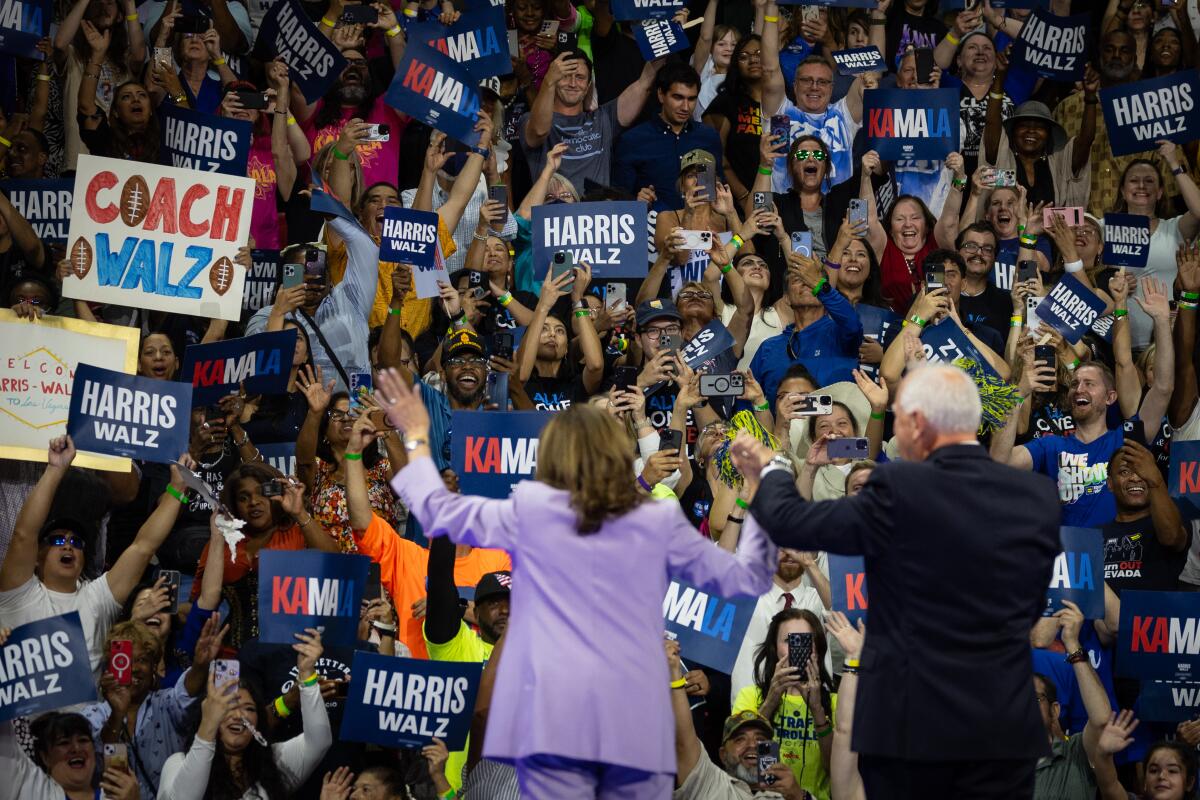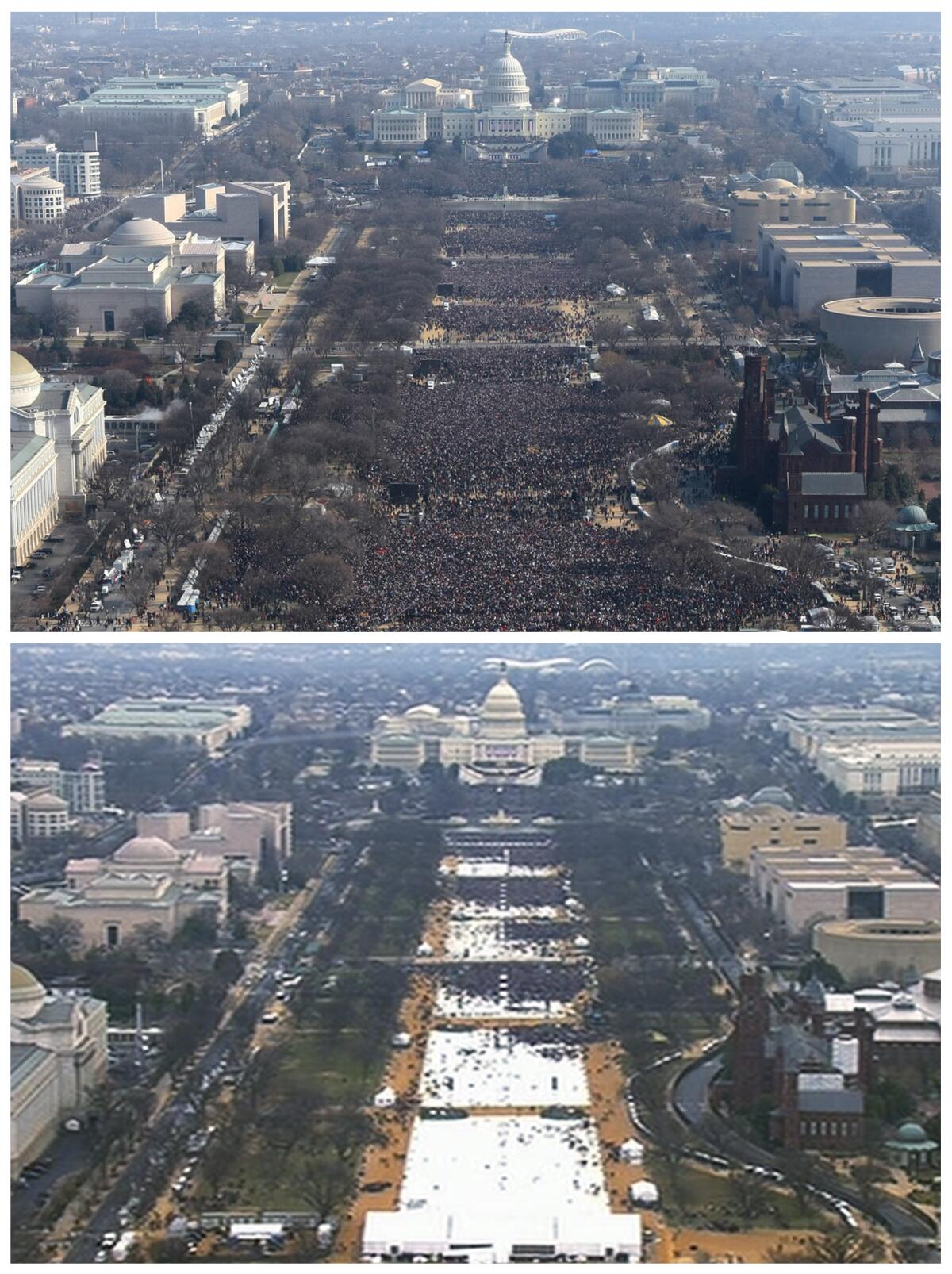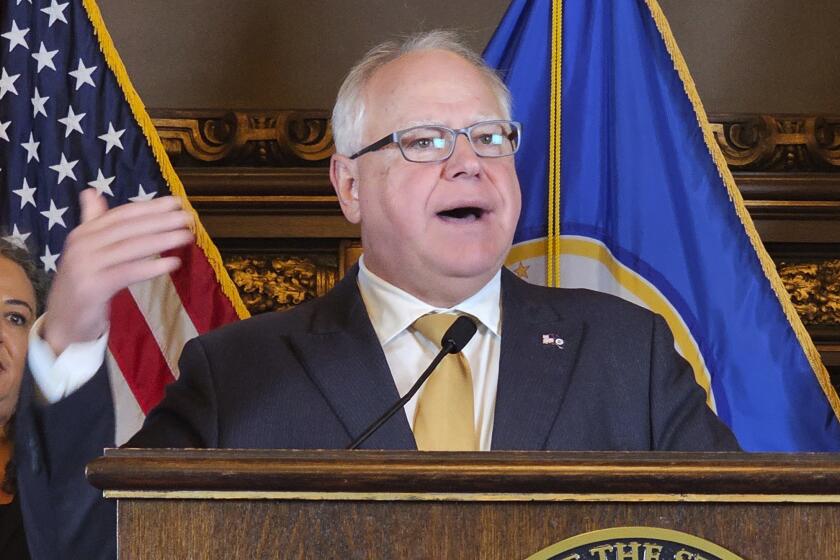Column: What Trump’s crowd obsession says about him — and the race for the White House

- Share via
Forget about the economy, the war in Gaza, the perils of global warming. Never mind the crime issue or that favorite Trumpian hobbyhorse, immigration and the border.
What really has the Republican presidential nominee worked up is crowd sizes. Specifically, the eye-popping assemblages that greeted Kamala Harris and her running mate, Tim Walz, in last week’s getting-to-you know gambol through battleground states.
More than 14,000 people turned out in Philadelphia. Roughly 15,000 giddy supporters swarmed Harris-Walz rallies in Las Vegas, suburban Detroit and outside Phoenix.
Trump’s cranium seemed ready to explode.
“She’s a CHEATER. She had NOBODY waiting, and the ‘crowd’ looked like 10,000 people!” Trump bleated in one post, claiming the hordes were actually AI-generated fakes. “This is the way the Democrats win Elections, by CHEATING - And they’re even worse at the Ballot Box. She should be disqualified because the creation of a fake image is ELECTION INTERFERENCE.”
Unlike, say, PAYING HUSH MONEY to a Pornographic Film actor to cover up an EXTRAMARITAL LIAISON that would have TANKED Trump’s TEETERING presidential campaign in its Final Days.
But we digress.
The selection of Minnesota’s governor as Harris’ running mate won’t decide the presidential race. All but an exceeding few voters will be focused on the top of the ticket.
There is no doubt the vice president is riding an incredible wave of enthusiasm.
Whether it’s crested as Democrats get beyond their all-is-not-lost exuberance, or continues building, the way Barack Obama drew super-sized crowds throughout the fall of 2008, remains to be seen.
But there’s no question that Trump is struggling to recalibrate and acclimate to a startling new political reality. His opponent is no longer a doddering 81-year-old throwback but his surging, future-facing replacement, who is 19 years younger than Trump and, for the moment, a far more captivating political figure
The former president, who requires attention the way others need oxygen, can’t stand being relegated to a mere afterthought.
George Arzt, a longtime observer of Trump, believes his crowd-size convulsions are telling.
“Donald is a very competitive guy and he always speaks in superlatives: ‘The biggest.’ ‘The best,’” said Arzt, a New York City political and public affairs consultant, whose history with the former Manhattan real estate developer goes back to the 1970s. (Trump, who’s been known to shave strokes to improve his golf game and add phantom floors to increase the size of his skyscrapers, once called the practice “truthful hyperbole.” Others would describe it more simply as “lying.”)
The impulse to exaggerate — and vent his frustration in run-on sentences with odd punctuation and random capitalization — is a sure sign Trump is in a swivet.
“He’s a person who, when in trouble, grasps at things,” Arzt said, “and then words just come spilling out.”
What is demonstrable — and the reason Trump has gone even more bonkers than usual — is that Harris has been drawing much bigger crowds than Trump or President Biden, whose campaign, before exiting, was a Democratic exercise in making the best of a funereal situation.

The Crowd Counting Consortium, a nonpartisan academic organization that tracks political gatherings across the U.S. — estimates Trump has drawn an average crowd of about 5,600 at this year’s events. Biden was attracting about 1,300 people. Harris, in her six rallies last week, had an average crowd of nearly 13,500.
That’s impressive. But crowd size, to be clear, reveals only so much about the state of a political contest.
“Crowd size can tell us something about enthusiasm, and enthusiasm is important for things like donations and volunteers,” said Jeremy Pressman, a University of Connecticut political science professor and co-director of the Crowd Counting Consortium, a joint project of the university and Harvard’s Kennedy School of Government.
“But it’s important to remember what it doesn’t tell us,” he went on. “It doesn’t tell us who’s ahead. It doesn’t tell us who’s winning. It doesn’t necessarily predict who’s going to win at the end of the day.”
A popular candidate may attract tens of thousands of people to a campaign rally. But that’s an infinitesimally small number compared with the 155 million Americans who voted in 2020 or the 138 million who turned out in 2016, and offers no meaningful gauge of where a race stands.
Crowds are also self-selected, which is to say, not necessarily reflective of broader sentiments. Attending a political rally requires a commitment of time and level of interest beyond that of the average voter. Bernie Sanders, for instance, had legions of faithful followers and routinely drew larger crowds than Biden throughout the 2020 primary season. Still, the senator from Vermont fell well shy of winning the Democratic nomination.
Vice presidential candidate Tim Walz, who gave the world ‘weird’ Republicans, says he and Kamala Harris will respond with joy. Team Trump says that’s absurd.
For now, Democrats are taking great glee in trolling Trump, posting side-by-side photos of his and Harris’ rallies and urging her supporters to turn out en masse, just to get inside Trump’s head — which has proved not at all difficult, given his long-standing crowd-count obsession. Recollect how the narcissist in chief spent his early days in the White House defending the laughable claim that his inauguration had outdrawn Obama’s.
“I’ve spoken to the biggest crowds,” Trump boasted at last week’s look-at-me-please news conference. “Nobody’s spoken to crowds bigger than me.”
He even claimed his Washington speech on Jan. 6, 2021 — which, not incidentally, preceded a violent attempt to overturn the 2020 election — drew more people than Martin Luther King Jr.’s famous address at the 1963 March on Washington. (Another lie.)
King had a dream.
Trump has delusions.
More to Read
Get the latest from Mark Z. Barabak
Focusing on politics out West, from the Golden Gate to the U.S. Capitol.
You may occasionally receive promotional content from the Los Angeles Times.












